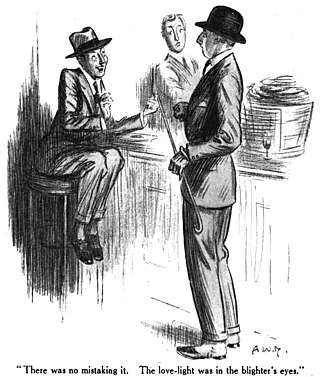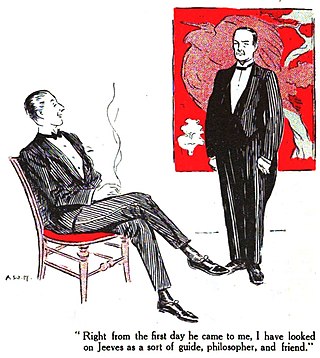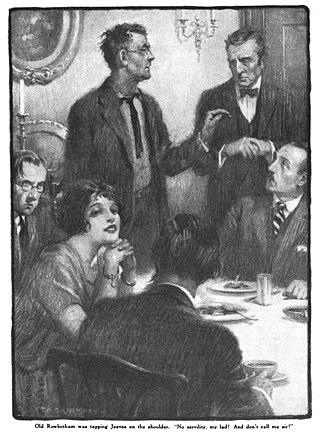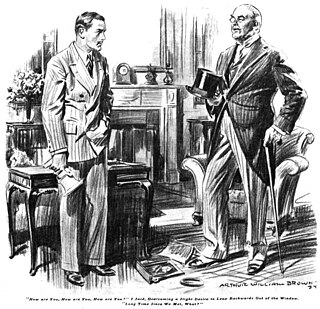
Richard P. "Bingo" Little is a recurring fictional character in the comedic Jeeves and Drones Club stories of English writer P. G. Wodehouse, being a friend of Jeeves's master Bertie Wooster and a member of the Drones Club.

The Inimitable Jeeves by P. G. Wodehouse was the first of the Jeeves novels, although not originally conceived as a single narrative, being assembled from a number of short stories featuring the same characters. The book was first published in the United Kingdom by Herbert Jenkins, London, on 17 May 1923 and in the United States by George H. Doran, New York, on 28 September 1923, under the title Jeeves.

"Jeeves in the Springtime" is a short story by P. G. Wodehouse, and features the young gentleman Bertie Wooster and his valet Jeeves. The story was published in The Strand Magazine in December 1921 in London, and in Cosmopolitan in New York that same month. The story was also included in the 1923 collection The Inimitable Jeeves as two separate chapters, "Jeeves Exerts the Old Cerebellum" and "No Wedding Bells for Bingo".

"The Great Sermon Handicap" is a short story by P. G. Wodehouse, and features the young gentleman Bertie Wooster and his valet Jeeves. The story was published in The Strand Magazine in London in June 1922, and then in Cosmopolitan in New York that same month. The story was also included in the collection The Inimitable Jeeves as two separate stories.

"Comrade Bingo" is a short story by P. G. Wodehouse, and features the young gentleman Bertie Wooster and his valet Jeeves. The story was published in The Strand Magazine in London in May 1922, and in Cosmopolitan in New York that same month. The story was also included in the 1923 collection The Inimitable Jeeves as two separate chapters, "Comrade Bingo" and "Bingo Has a Bad Goodwood".
"The Purity of the Turf" is the third episode of the first series of the 1990s British comedy television series Jeeves and Wooster. It is also called "The Village Sports Day at Twing" or "The Gambling Event". It first aired in the UK on 6 May 1990 on ITV. The episode aired in the US on 25 November 1990 on Masterpiece Theatre.

"Aunt Agatha Takes the Count" is a short story by P. G. Wodehouse, and features the young gentleman Bertie Wooster and his valet Jeeves. The story was published in The Strand Magazine in London in April 1922, and then in Cosmopolitan in New York in October 1922. The story was also included in the 1923 collection The Inimitable Jeeves as two separate chapters, "Aunt Agatha Speaks Her Mind" and "Pearls Mean Tears".

"Scoring off Jeeves" is a short story by P. G. Wodehouse, that features a young gentleman Bertie Wooster and his valet Jeeves. The story was published in The Strand Magazine in London in February 1922, and then in Cosmopolitan in New York in March 1922. The story was also included in the 1923 collection The Inimitable Jeeves as two separate chapters, "The Pride of the Woosters Is Wounded" and "The Hero's Reward".

"Sir Roderick Comes to Lunch" is a short story by P. G. Wodehouse, and features the young gentleman Bertie Wooster and his valet Jeeves. The story was published in The Strand Magazine in London in March 1922, and then in Cosmopolitan in New York in April 1922. The story was also included in the 1923 collection The Inimitable Jeeves as two separate chapters, "Introducing Claude and Eustace" and "Sir Roderick Comes to Lunch".

"The Metropolitan Touch" is a short story by English writer P. G. Wodehouse, and features the young gentleman Bertie Wooster and his valet Jeeves. The story was published in The Strand Magazine in London in September 1922, and then in Cosmopolitan in New York that same month. The story was also included in the 1923 collection The Inimitable Jeeves.

"Bingo and the Little Woman" is a short story by P. G. Wodehouse, and features the young gentleman Bertie Wooster and his valet Jeeves. The story was published in The Strand Magazine in London in November 1922, and then in Cosmopolitan in New York in December 1922. The story was also included in the collection The Inimitable Jeeves as two separate stories, "Bingo and the Little Woman" and "All's Well".

"The Artistic Career of Corky" is a short story by P. G. Wodehouse, and features the young gentleman Bertie Wooster and his valet Jeeves. The story was published in the Saturday Evening Post in the United States in February 1916, and in The Strand Magazine in the United Kingdom in June 1916, as "Leave it to Jeeves". The story was also included in the 1925 collection Carry On, Jeeves.

"The Rummy Affair of Old Biffy" is a short story by P. G. Wodehouse, and features the young gentleman Bertie Wooster and his valet Jeeves. The story was published in the Saturday Evening Post in the United States in September 1924, and in The Strand Magazine in the United Kingdom in October 1924. The story was also included in the 1925 collection Carry On, Jeeves.
"Clustering Round Young Bingo" is a short story by P. G. Wodehouse, and features the young gentleman Bertie Wooster and his valet Jeeves. The story was published in the Saturday Evening Post in the United States in February 1925, and in The Strand Magazine in the United Kingdom in April 1925. The story was also included in the 1925 collection Carry On, Jeeves.
"Jeeves and the Impending Doom" is a short story by P. G. Wodehouse, and features the young gentleman Bertie Wooster and his valet Jeeves. The story was published in The Strand Magazine in the United Kingdom in December 1926, and in Liberty in the United States in January 1927. The story was also included as the first story in the 1930 collection Very Good, Jeeves.
"Jeeves and the Song of Songs" is a short story by P. G. Wodehouse, and features the young gentleman Bertie Wooster and his valet Jeeves. The story was published in The Strand Magazine in the United Kingdom in September 1929, and in Cosmopolitan in the United States that same month. The story was also included as the fourth story in the 1930 collection Very Good, Jeeves.
"Jeeves and the Old School Chum" is a short story by P. G. Wodehouse, and features the young gentleman Bertie Wooster and his valet Jeeves. The story was published in The Strand Magazine in the United Kingdom in February 1930, and in Cosmopolitan in the United States that same month. The story was also included as the ninth story in the 1930 collection Very Good, Jeeves.
"Indian Summer of an Uncle" is a short story by P. G. Wodehouse, and features the young gentleman Bertie Wooster and his valet Jeeves. The story was published in The Strand Magazine in the United Kingdom in March 1930, and in Cosmopolitan in the United States that same month. The story was also included as the tenth story in the 1930 collection Very Good, Jeeves.

What Ho! Jeeves is a series of radio dramas based on some of the Jeeves short stories and novels written by P. G. Wodehouse, starring Michael Hordern as the titular Jeeves and Richard Briers as Bertie Wooster.














